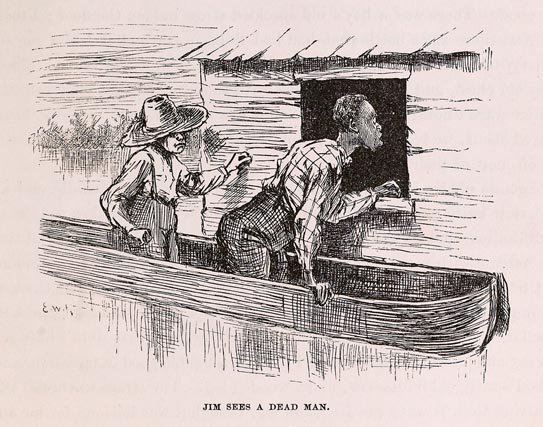A stretch of river XXXV: "Here comes a frame-house down on the west side."
 (Go here for the source for the title of the post)
(Go here for the source for the title of the post)
Well, okay. No house came floating down our stretch of the Little Arkansas this past week, much less one with a dead man inside it. But from Saturday to Wednesday the river slowly rose, due to the rain and snow we've had in town and in the river's watershed to the north and west of Wichita, to about a foot and a half higher than usual. Though that doesn't sound like much, the rise led to two things: 1) The river flowed much faster than it usually does; 2) Just as Huck notes in Huckleberry Finn, when the river rises, all sorts of things came floating down it that one usually doesn't see in this or, I suspect, in most any river. So for those few days Scruffy and I vicariously made like Huck and Jim on our walks (the analogues being, in case you're wondering, pretty fluid, and this out of necessity since, as Jim has Huck acknowledge elsewhere in the novel, a cat is not a man).
This made for occasionally interesting, curious viewing those few days. But little romance arose from the accretion of debris. It was, to borrow Frost's phrase from another context, "a diminished thing."
Without a doubt, the strangest thing we saw in the river was on Saturday morning: a sofa cushion floating majestically down its center, sitting so high on the surface that it appeared to have been inflated. After that came, on succeeding days, the inventory of a small sporting goods store: a basketball, a football, and a soccer ball. All were cheap, and all had seen better days. There was a fair amount of driftwood to see, too, some of it surprisingly large. The rest was the usual sort of garbage (literally) that one would expect to see floating on a river in flood that flows through an urban area: liquor bottles; beer and soda-water cans; pieces of styrofoam chests . . . you get the idea.
Perhaps I am jaded: I know, if I account for Huck's adolescent-boy's filter on his narrator's lens, that he's just looking at river trash, too. I must also account for the fact that his river is the Mighty Mississip' while mine is the Little Arkansas. Or is this an example of a failure of the imagination--that if I squinted in just the right way I could see magic or fancy in that debris. But no. The imagination can invent only so much; as Wallace Stevens notes, making a poetic career out of doing so, it has its starting place in reality (whatever that was). It cannot invent ex nihilo.
Well: Huck's having seen the house means that I can, too: its extravagance is something I can attest to as well, if only vicariously. A whole house--and Scruffy and I had seen a cushion from one of its sofas. A diminished thing, yes. But something. Enough.



























2 comments:
A solid addition to the "River" series.
Once, a buddie and I floated the Missouri from where I-70 crosses it west of Columbia all the way to Jefferson City.
It's different down close and you're right about the stuff you see floating along on its way, perhaps, to New Orleans and beyond.
Query: Is the Mississippi watershed, which washes the interior of the country clean of the detritus of Man, some sort of metaphor? Perhaps something concerning the middle of this country versus what happens on the coasts, which never seem to get "clean."
More to think about, darn you. :)
I'll let you handle that one. I've got to go to a soccer game tomorrow morning at an ungodly hour.
Cheers.
Randall,
Whenever I teach Huckleberry Finn, I give a little opening lecture about the Mississippi, that if there is a geographical feature that the country has in common, it would be that river. Surely that simple fact is part of that novel's appeal. Thematically for that novel, too, it's crucial: it flows south, and Huck and Jim are, too, despite Jim's running away. Its hydrology forces the action in the novel.
Post a Comment